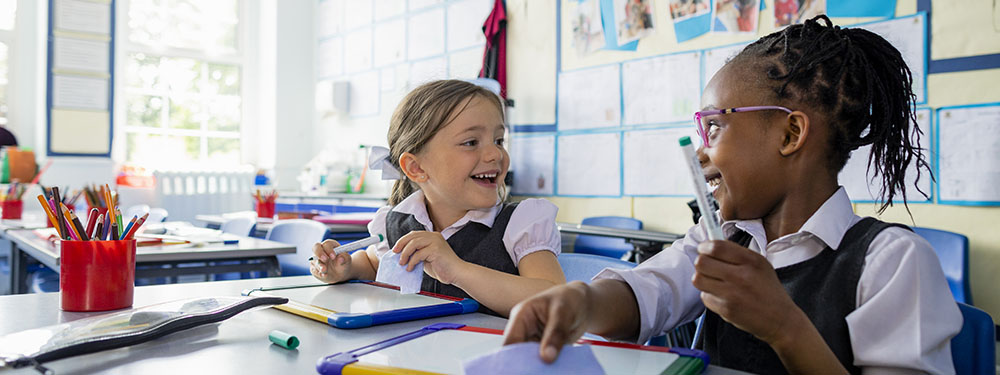
A panel discussion with leaders of the lower school at GEMS Wellington International School. The full panel discussion video recording can be found here.
Transitioning from the foundation stage (FS) to year one is a significant milestone for students. It marks a monumental shift from the early years foundation stage framework to the national curriculum: a more formal learning environment and often their first memorable experiences of new teachers and staff. The transition process aims to ensure that children feel confident in their journey and that their move is as smooth as possible.
Who should be involved?
Everyone involved in the child’s life! One of the key aspects of a successful transition is the support provided to both parents and students, alongside the transition of information between teachers and school teams. A key element of the early years framework, focuses on developing personal, social and emotional skills in children so that they feel confident and secure in their new environment. Additionally, it is crucial to involve parents at each stage in the transition process and make them aware of what to expect. This includes informing them about the variety of transition opportunities available before, during and after joining the school, particularly in more mobile multinational cities such as Dubai. This involves arranging opportunities for both existing and new students to meet their new teachers before the start of the academic year. At WIS, new starters also have their own dedicated day to explore their new learning environment and become comfortable with their physical learning environments. At a leadership level, it is also vital that the right staff are in the right place to. The teaching teams take weeks to construct and are formed with expert knowledge and skill.
The difference between foundation and year one
Understanding the differences between the foundation stage and year one is essential for a successful transition. In the foundation Stage, the focus is on the Development Matters framework and achieving the early learning goals. By the end of FS2, children who have achieved these goals are well-prepared for the transition to year one. For those who are not quite there, a more targeted, different approach is required, such as a further increase in continuous provision. It is also important to consider that any new starters may include children who have never attended school before. Therefore a longer transition period may be required to fully match and suit their needs. To meet our high expectations, WIS mirrors the play-based learning approach of term 3 in foundation stage during the first term of year one. Learning areas are separated in a similar way to foundation and as the year progresses, students become more independent and adept at accessing the national curriculum. It is crucial to educate parents about the change in expectations, as exceeding in foundation stage does not automatically mean exceeding in year one. Each child’s progress is measured based on their own starting point and will look very different for each child at the start of their national curriculum journey.
How do we know we have been successful?
The success of the transition can be measured by observing the children’s confidence in the first few days of year one. As they become more familiar with their new environment, the amount of transition support they require from adults decreases. It is essential to address parental questions, queries and concerns during this initial period too. Parents can often worry more than the students themselves. It is crucial to know that the school staff, who are highly trained and well-prepared, are there to support both parents and children at all stages. Communication is essential. Effective communication channels should be established to encourage parents to reach out to create a whole picture of each and every child. It is important to instil a positive mindset in parents and remind them that this transition represents a new and exciting opportunity for their child’s growth. The emphasis on social and emotional progress in the foundation stage helps children feel confident expressing themselves and their needs, which they can carry into the “big school” environment. Even if children are new to the school, staff invest considerable time in getting to know them during term three and term one. This is reflected in the vast amount of successful transitions that we see!
Pastoral vs academics for our youngest learners
Balancing pastoral care and academics is a key aspect of the transition process. Building confidence and independence in students goes hand in hand with developing academic skills. Personalised experiences are created to understand what motivates each child and ensure they feel safe in their new learning environment. Teacher handovers incorporate a wealth of information about the children, allowing for a seamless continuation of support. The GroWell curriculum at WIS focuses on linking behaviours and learning; helping students make progress in both aspects. Additionally, the school provides a counselling team to support any students who require extra assistance. By prioritising the pastoral element and ensuring students feel secure, the academic aspects naturally follow. It is crucial to emphasise that the transition should not be seen as a scary experience but rather an exciting opportunity for growth. Enthusiasm and open conversations about the upcoming changes can help alleviate any concerns and those conversations can never come too early!
The transition from the foundation stage to year one involves careful planning and support for the whole school community surrounding each and every child. By ensuring a smooth and confident move, involving parents in the process and balancing pastoral care with academic development, schools can create a positive transition experience. The aim is to empower students to embrace their new learning environment and embark on an exciting journey of personal and educational growth.
